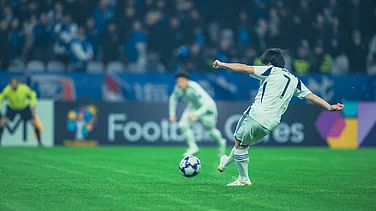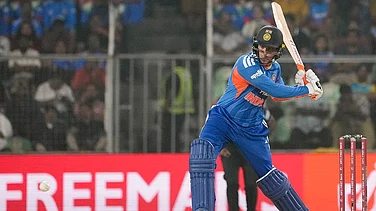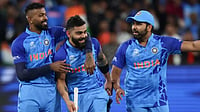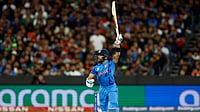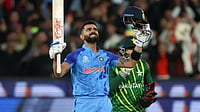From a tense three-wicket win in Dambulla for India in the 2010 edition to Pakistan eking out a one-wicket victory four years later in Mirpur, there have been some epic encounters between the two in the competition. India have played Pakistan 14 times in the Asia Cup and enjoy an 8-5 record. One game ended in a tie.
Let’s take a look at some of the most thrilling encounters between India and Pakistan at the Asia Cup.
Dambulla, 2010 (Round-robin stage) – India Win By 3 Wickets
Chasing Pakistan’s 267, India needed seven runs of the final six balls with Suresh Raina and Harbhajan Singh at the crease. Raina, who was India’s last hope, got run out on the second ball, and the pressure shifted to Harbhajan. The off-spinner bailed India out in style as he smacked Mohammad Amir for a six on the penultimate delivery to help his team win by three wickets. Earlier, Gautam Gambhir anchored India’s chase with 83 off 97 balls. His 98-run stand with Mahendra Singh Dhoni (52) for the third wicket steadied the Indian ship after the early wickets of Virender Sehwag and Virat Kohli. Salman Butt top scored for Pakistan with 74.
Mirpur, 2014 (Group Match) – Pakistan Win By 1 Wicket
Pakistan restricted India to 245/8, thanks to Saeed Ajmal’s three wickets. However, Pakistan made a mockery of their chase until Shahid Afridi turned out to be the saviour. Pakistan were 113/4 in the 23rd over before Sohaib Maqsood joined hands with Mohammed Hafeez (75) and stitched 87 runs for the fifth wicket. But once the partnership was broken by Ravichandran Ashwin, the Misbah-ul-Haq-led side went from 200/5 to 239/9 within a space of six overs. With 10 runs needed from the last over, Afridi smashed Ashwin for back-to-back sixes to cap a memorable win for Pakistan. For India, Rohit Sharma (56), Ambati Rayudu (58) and Ravindra Jadeja (52 not out) scored fifties.
Dubai, 2018 (Super Four) – India Win By 9 Wickets
This is the only edition when India and Pakistan met twice. India brushed off the Pakistan challenge by eight wickets in the group stage. But the Super Four clash holds much more importance as a victory there helped India edge over others, as their match against Afghanistan ended in a tie. Batting first, Pakistan rode on Shoaib Malik’s 78 to post 237/7. In reply, Rohit Sharma (111 not out) and Shikhar Dhawan (114) hit blistering tons en route to a nine-wicket win. The duo shared a 210-run opening stand.
Mirpur, 2012 (Group Match) – India Win By 6 Wickets
The final encounter in this list has to be a Virat Kohli show from the 2012 edition. Riding on centuries from Mohammad Hafeez (105) and Nasir Jamshed (112), Pakistan put on board a mammoth 329/6. In reply, Hafeez sent shockwaves around the Indian camp when he had Gautam Gambhir out for a duck. But then came Kohli, who, along with Sachin Tendulkar (52) stabilised the Indian innings with a 133-run stand. Kohli then put on a 172-run stand with Rohit Sharma (68). He was out for 183 off 148 balls that included 22 fours and a six as India romped to a comfortable six-wicket win. It is Kohli’s highest ODI score.
Best Performances in Ind-Pak Games In Asia Cup
Virat Kohli (IND) – 183 (148b, 22x4, 1x6) vs Pakistan – 2012 (Mirpur)
Shoaib Malik (PAK) – 143 (127b, 18x4, 1x6) vs India – 2004 (Colombo)
Aaqib Javed (PAK) – 5/19 vs India – 1995 (Sharjah)
Arshad Ayub (PAK) – 5/21 vs India – 1988 (Dhaka)
Hardik Pandya (IND) – 3/8 vs Pakistan – 2016 (Mirpur).












